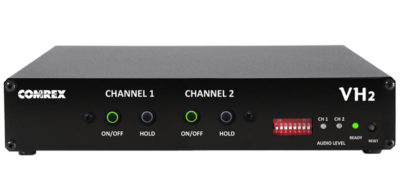Welcome to Codec Answer Guy Presents, the blog series where we address some of the questions, concerns, and doubts we hear most frequently from radio and television professionals.
I’ve been hearing about VoIP for years. Mostly I’ve just heard horror stories from other radio people about dropped audio and bad sound quality. What even is it?
VoIP (Voice Over IP) is a series of protocols that enable computer networks and other devices to emulate traditional phones and phone lines. Chances are, you’re already using VoIP in your home or office because most modern business PBX systems have migrated from Plain Old Telephone Service (POTS), already. In some areas, POTS isn’t even available anymore, and VoIP is the only option.
As with a traditional phone line, there’s a service provider, and an end user with telephone equipment. However, in this case, the provider is based on an IP network (in other words, it’s in “the cloud”). The end user equipment can be a specialized VoIP telephone, or software running on a PC or mobile device.
While the installation process for VoIP is drastically different than it is for traditional phone lines, once it’s in, VoIP radio gear works much like its POTS equivalents. (And with some additional functions!)
How reliable is VoIP equipment, exactly?
It all boils down to your internet connection. Think about it in terms of your computer. Even if you’ve got the most sophisticated laptop in the world, you won’t be able to Skype your niece in Kansas if your internet connection is too slow. Here are some ways to ensure that your broadcasts will sound crystal clear:
- If you’re using any kind of IP broadcasting equipment, it’s important to get the best possible connection. If you have the leeway to do so, it’s important to work with your IP provider to find a system that’s both cost effective, and reliable.
- Choose your SIP provider carefully. There are a lot of low-end SIP providers out there, who use a technique called low-cost routing (LCR) – this saves you money, but results in poor audio quality, dropped calls, and a bad sound. (Click here to read some good advice on choosing a SIP provider.)
- Another great way to improve reliability – set up a second internet connection. In the event that the first one fails, you’ll have a backup just in case.
- Finally, you’ll want to make sure you optimize your network, in any way you can. Here’s a list of suggested steps – consult with your IP provider for recommendations more tailored to you.
There are so many acronyms! I miss having physical wires that could be plugged in and moved around.
Yeah, there are a lot of acronyms. It’s a pretty steep learning curve! Transitioning from setting up a POTS system to programming a SIP trunk is like relocating to a colony on Mars. Don’t be scared to Google voraciously, ask your IP engineer for help, or call us with any questions. We’ve been handling this IP stuff since before it was cool.
You know, I looked at those articles you linked to, and I’m not just setting up VoIP to use with the phones in my office – I need to put people on the radio.
We know. Comrex has 50 years of expertise in audio transmission. We know what radio requires, and we strive to create intuitive, easy-to-use equipment that reliably produces exceptional results. We’ve been working with audio over IP since 2005, and we’re experts now. We’ve got you!
Is the audio quality over VoIP really that great?
Yes! In fact, it’s often better than POTS. For example, Comrex’s VH2 hybrid supports more than just standard narrowband 3kHz audio (G.711). It also can handle wideband voice calls (made with a G.722 codec). So can STAC VIP (our VoIP call management system)!
via Comrex

